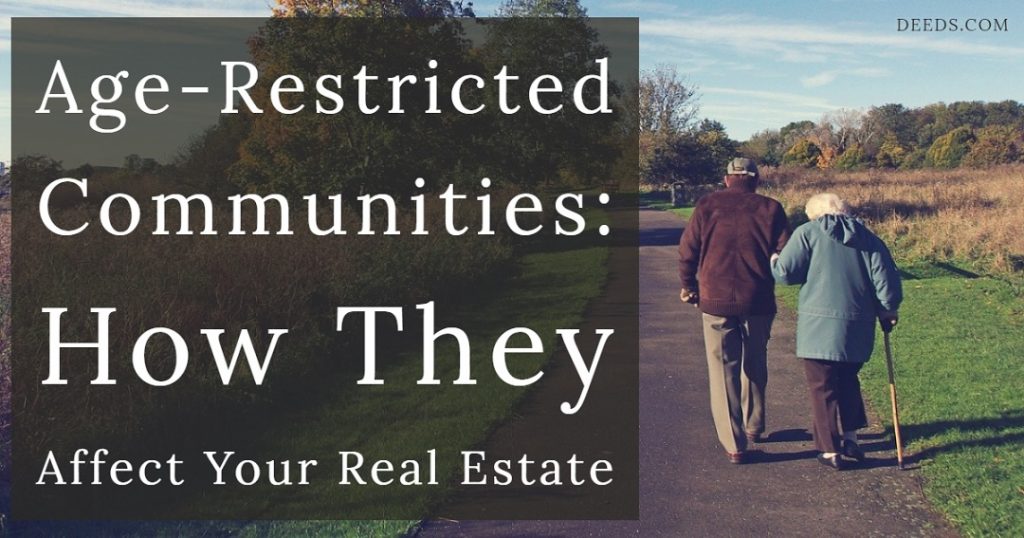
Looking at homes in a 55+ community? You might wonder: Will I be able to leave my age-restricted condo home to my children?
Before buying your new home in an age-restricted community, check the homeowners’ association rules on inheritance. Your realtor might have mentioned two pertinent guidelines these communities follow: the nationwide 80/20 rule, and the property’s own minimum age rule. We’ll flesh out these guidelines here.
The 80/20 Rule: History and Purpose
Depending on how your title is vested, your children may inherit your unit, and the community may allow them to live there, as long as they don’t upset the federally mandated 80/20 ratio: 80%+ of the occupied units must include at least one person who is 55 or older. And if your children have children of their own, your grandkids might be too young to stay.
But wait. Doesn’t the federal Fair Housing Act forbid discrimination in real estate transactions, including the “familial status” of having young children? Yes, but it exempts senior housing. And the Housing for Older Persons Act (HOPA) of 1995 defines senior housing as a community operated for occupancy by at least one person aged 55+ per unit—whether or not the property offers significant features designed for elders. In other words, over-55 or “active adult” communities are allowed a good deal of leeway to set age restrictions.
Outside the HOPA or the Fair Housing Act, the right of a surviving spouse or a child to live on the property after the 55+ resident passes away is an issue for state and local policy. It will have been laid out in the original contractual agreements between developers and purchasers. The federal 80/20 provision was designed, at least in part, to allow a senior community to plan for inevitable ownership changes, yet keep its age-related exemption, in these very cases.
The Rules and Regulations of a senior housing association sets forth the actual allowed percentage of units for residents under 55. Individual properties can have more stringent rules than the 80/20 formula. Moreover, even if a 55+ community has (and is comfortably under) a standard 80/20 limit, its rules still might force heirs under 55 to sell the unit.
Bottom line? Check the community’s Rules and Regulations to avoid surprises.
The Community’s Minimum Age Rule: No Kids Allowed?
The typical senior community’s minimum age rule is 18+ for residents. Some raise their minimum to age 21 over even higher. This means you won’t want to pass one of these units along to your children if they have young kids, unless your children understand they will be selling the unit.
So, basically, most 55+ communities don’t let kids (under 18, or the specific age set by the rules) live on-site unless an exemption is made. Furthermore, most communities require any resident who’s under 55 to live in a unit occupied by someone 55 or older.
Now, you might be asking: Can my grandchildren visit and stay with me at a 55+ community?
Nearly all age-restricted properties do let children visit—typically, for a time limit ranging anywhere from two weeks to three months in a given year. Review the Rules and Regulations to find restrictions on children as guests. They might include a provision for registering young visitors and keeping tabs on the time they spend on the property. Youngsters might also be barred from using the property’s amenities without adults present, given insurance restrictions. Be sure you’re comfortable with these provisions before buying.
On the Rise: Senior Co-Ops
Senior co-ops are becoming popular choices for people who wish to live in communities governed directly by the residents. The main idea behind the senior co-op is to age comfortably, surrounded by an involved and mutually supportive group of people.
Most co-ops only have one property deed. The residents hold shares, as though in a corporation. Shareholders can convey their shares. But the transfer of shares is subject to the co-op board’s approval. What about heirs? Check the terms in the proprietary lease before investing. Some allow transfers of co-op shares to beneficiaries through a will or through a revocable trust. Some do not.
Moreover, inheriting a co-op share does not necessarily mean being allowed to live there. Most co-ops will at least want the person who will get the unit to come in for an interview and vetting process. If the transfer doesn’t work out, the heir may be able to sell the shares back to the co-op.
You’ll need to think about vesting in advance. Co-op owners should know how titling is done on the share certificates. If a couple owns as tenants in common, their interests will go into probate when they pass away. Therefore, owners as tenants in common need wills that state exactly how they want their shares conveyed. What happens if an unmarried co-op resident leaves shares to a life partner? A court would likely find that anti-discrimination laws compel the co-op to treat the life partner as it would treat a spouse in the same situation.
The Importance of Case-Specific Advice
As with anything that involves federal law, state policy, and local custom, there are plenty of possible situations beyond the scope of our series, which is for your general information only. An attorney can explain the state probate code, real estate documents, or your beneficiary’s rights. An attorney can also advise you if anti-discrimination laws may have been violated.
Perhaps most important of all, an attorney can help you state your clear intentions in your will or trust, real estate title, or other legal documents. Whether you choose a senior co-op or condo, things can get difficult later if someone contests your will. And the condo or co-op fees must be paid until probate is settled, or the home is sold to a new resident.
Consider your move to a 55+ community the right time to get your estate plan in good shape, too. Then enjoy your golden years. You’ve earned them.
